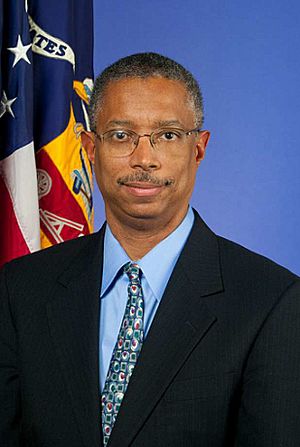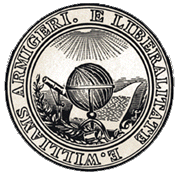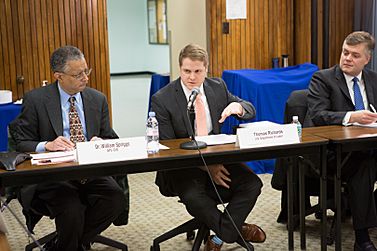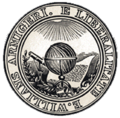William Spriggs facts for kids
Quick facts for kids
Bill Spriggs
|
|
|---|---|
 |
|
| Assistant Secretary of Labor for Policy | |
| In office 2009–2012 |
|
| President | Barack Obama |
| Preceded by | Leon Sequeira |
| Succeeded by | Rajesh Nayak |
| Personal details | |
| Born |
William Edward Spriggs
1955 Washington, D.C., U.S. |
| Died | (aged 68) |
| Education | Williams College (BA) University of Wisconsin–Madison (MA, PhD) |
| Academic career | |
| Institutions | Howard University Norfolk State University North Carolina A&T State University |
| Field | Labor economics |
William Edward Spriggs (1955 – June 6, 2023) was an important American economist. He was known for his work on fair pay and workers' rights. He taught economics at Howard University and was also the chief economist for the AFL–CIO, a large group of labor unions.
From 2009 to 2012, Spriggs served in the government. He was the Assistant Secretary of Labor for Policy under President Barack Obama. His research often looked at how to make workplaces fairer for everyone. This included topics like the minimum wage and equal pay.
Contents
Early Life and Learning
Bill Spriggs was born in Washington, D.C.. His father was a Tuskegee Airman and a professor with a PhD in physics. His mother was a World War II veteran and a school teacher.
Spriggs went to public schools in Washington D.C. He earned a Bachelor of Arts degree from Williams College. He studied economics and political science there.
He then went to graduate school at the University of Wisconsin–Madison. He earned both his Master of Arts (MA) and PhD degrees in economics. A PhD is a very high university degree. His main research for his PhD looked at how African Americans built wealth in Virginia in the early 1900s.
His Career Journey
Starting Out in Teaching
Spriggs began his career as a professor. He taught introductory economics at North Carolina A&T State University. Later, he moved to Norfolk State University. There, he directed the honors program and taught management for six years.
Working for Change
Spriggs left teaching for a while to focus on research and helping others. He worked at the Economic Policy Institute. Here, he studied how workers and companies interact. He also looked at the history of labor and what happens when workers go on strike.
In 1993, Spriggs joined the Clinton administration. He advised leaders on job training, education, and helping people find new jobs. He also worked on projects to support historically black colleges and universities.
Helping the Government
Spriggs continued to serve in federal roles. He worked for the United States Congress Joint Economic Committee. He advised members of Congress on economic issues. He also worked in the United States Department of Commerce and the Small Business Administration. These roles helped him understand how government policies affect businesses and workers.
After leaving the Clinton administration, Spriggs became the executive director of the Institute for Opportunity and Equality League. He worked with other civil rights activists. He focused on research and policies that would help create a fairer society.
Working with President Obama
Spriggs was a strong supporter of Barack Obama. He helped with Obama's team when he was becoming president in 2008. Spriggs believed in Obama's plan to create new jobs in clean energy.
In 2009, President Obama chose Spriggs for an important job. He became the Assistant Secretary of Policy in the United States Department of Labor. In this role, Spriggs continued to support organized labor and help the middle class. He also represented the U.S. at international meetings about labor.
Returning to Academia
In 2012, Spriggs went back to Howard University. He continued teaching economics there. He also took on a new role as the chief economist for the AFL–CIO. This meant he helped guide the economic policies of many labor unions.
An Open Letter to Economists
In 2020, after the murder of George Floyd, Spriggs wrote an important open letter. He asked other economists to think about how history and unfairness have shaped economic differences between groups of people. He explained that when economists study differences in wealth or jobs, they should remember how past events and policies have affected people.
Spriggs encouraged economists to look closely at the systems that create economic outcomes. He wanted them to understand how different groups of people have been treated over time. His letter received a lot of attention and helped start important conversations.
Death
William Spriggs passed away on June 6, 2023. He was 68 years old.
Honors
Spriggs received many awards for his important work:
Professional Awards
- Robert M. Ball Award, National Academy of Social Insurance, 2016
- Benjamin L. Hooks "Keeper of the Flame" Award, NAACP, 2014
- Chairman's Award, Congressional Black Caucus, 2003
- National Economics Association Dissertation Award, 1985
- National Science Foundation Minority Graduate Fellow, 1979-1984
Other Recognitions
- Bicentennial Award, Williams College, 2010
- Harold Graves Essay Prize (University of Wisconsin-Madison, Department of Economics) 1980
Images for kids
 | Claudette Colvin |
 | Myrlie Evers-Williams |
 | Alberta Odell Jones |






